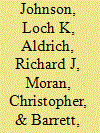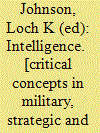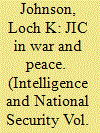|
|
|
Sort Order |
|
|
|
Items / Page
|
|
|
|
|
|
|
| Srl | Item |
| 1 |
ID:
024471


|
|
|
|
|
| Publication |
Oxford, University Press, 1989.
|
| Description |
xxiv, 344p.
|
| Standard Number |
0195054903
|
|
|
|
|
|
|
|
|
|
|
|
Copies: C:1/I:0,R:0,Q:0
Circulation
| Accession# | Call# | Current Location | Status | Policy | Location |
| 032672 | 327.1273/JOH 032672 | Main | On Shelf | General | |
|
|
|
|
| 2 |
ID:
081904


|
|
|
|
|
| Publication |
2008.
|
| Summary/Abstract |
Since 1975, lawmakers have displayed four responses to the call for greater intelligence accountability on Capitol Hill. Some have taken the approach of 'ostriches', content to bury their heads in the sand and continue the earlier era of trust when members of Congress deferred to the decisions of the executive branch within the domains of intelligence. Others - indeed, a majority - have chosen to become unalloyed boosters for intelligence -' cheerleaders' who view their job primarily as one of explaining the value of intelligence to the American people and supporting intelligence missions with robust funding and encouragement. Taking the opposite approach, another set of lawmakers - the 'lemon-suckers' - have consistently found fault with America's attempts to spy on adversaries or overthrow regimes that fail to accommodate US interests. Finally, some lawmakers have been 'guardians', striking a balance between serving as partners of the intelligence agencies on Capitol Hill and, through a persistent examination of budgets and operations, demanding competence and law-abiding behavior from these agencies. The guardian model fits best into the framework of democratic theory.
|
|
|
|
|
|
|
|
|
|
|
|
|
|
|
|
| 3 |
ID:
137058


|
|
|
|
|
| Summary/Abstract |
In this previously unpublished interview, James R. Clapper, Jr., the current Director of National Intelligence (DNI) in the United States, discusses his experiences as spymaster leading an Intelligence Community widely viewed as organizationally decentralized and criticized in the past for failing to work together harmoniously. Director Clapper argues that the Community has become much more structurally integrated, and that the Office of the DNI (ODNI) provides an opportunity for leadership that is more effective than outside critics have acknowledged. I conducted this interview in August 2014 at his office near Tyson's Corner in North Arlington, Virginia. It was a time of rising unrest in the world, with elite Russian troops carrying out forays across the border into Ukraine, a Middle East terrorist faction known as ISIS gathering momentum in a march from Syria toward Baghdad, and with recurring violence that continued to plague the relationship between the Hamas faction in Palestine and the state of Israel
|
|
|
|
|
|
|
|
|
|
|
|
|
|
|
|
| 4 |
ID:
082828


|
|
|
|
|
| Publication |
2008.
|
| Summary/Abstract |
The two most prestigious products prepared by the US intelligence agencies for use by decision-makers in Washington, DC, are the President's Daily Brief and the National Intelligence Estimate. The Brief, an example of 'current intelligence,' adds value to what policy officials in Washington can learn about world affairs from the best newspapers, especially in the domains of foreign weaponry, activities within closed societies, and the machinations of terrorist organizations. The National Intelligence Estimate, an example of 'research intelligence,' has added value, too, on occasion, but has often been wrong. Each of these forms of intelligence has their critics, and the NIE in particular is frequently considered too long a document and too diluted in content. The production of NIEs has varied over the years since 1950, averaging twenty-three a year with a low of five (in 1976) and a high of fifty-six (in 1992).
|
|
|
|
|
|
|
|
|
|
|
|
|
|
|
|
| 5 |
ID:
159931


|
|
|
|
|
| Summary/Abstract |
Admiral Stansfield Turner, a former chief of the U.S. Intelligence Community (formally, the Director of Central Intelligence or DCI), died in early 2018. He served as DCI during the Carter Administration, where he was known to be an advocate of stronger intelligence accountability. This previously unpublished interview with him from 1991 discloses his views on a range of intelligence topics, as he reflected back on his experiences a decade after his tenure as DCI.
|
|
|
|
|
|
|
|
|
|
|
|
|
|
|
|
| 6 |
ID:
134056


|
|
INS special forum: implications of the Snowden leaks
/ Johnson, Loch K; Aldrich, Richard J; Moran, Christopher,; Barrett, David M, Hastedt, Glenn, Jervis, Robert, Krieger, Wolfgang, McDermott, Rose, Omand, David, Phythian, Mark, Wark, Wesley K
|

|
|
|
|
| Publication |
2014.
|
| Summary/Abstract |
In 2013, the National Security Agency (NSA) in the United States became embroiled in controversy - again. Its questionable use of wiretaps (Operation MINARET) and its improper reading of international cables sent and received by Americans over decades (Operation SHAMROCK) had been revealed by the Church Committee in 1976; and in 2005 the New York Times disclosed that the NSA had been wiretapping selected American citizens without a warrant, contrary to the Foreign Intelligence Surveillance Act of 1978.
|
|
|
|
|
|
|
|
|
|
|
|
|
|
|
|
| 7 |
ID:
104370


|
|
|
|
|
| Publication |
London, Routledge, 2011.
|
| Description |
4vol. set; xxxv, p.
|
| Contents |
Vol. 1: Collection and analysis of national security intelligence
Vol. 2: Covert action: the aggressive arm of national security intelligence
Vol. 3: Counterintelligence: Shield for national security intelligence
Vol. 4: Holding national security intelligence accountable
|
| Standard Number |
9780415569712, hbk
|
|
|
|
|
|
|
|
|
|
|
|
Copies: C:4/I:0,R:4,Q:0
Circulation
| Accession# | Call# | Current Location | Status | Policy | Location |
| 055951 | 327.12/JOH 055951 | Main | On Shelf | Reference books | |
| 055952 | 327.12/JOH 055952 | Main | On Shelf | Reference books | |
| 055953 | 327.12/JOH 055953 | Main | On Shelf | Reference books | |
| 055954 | 327.12/JOH 055954 | Main | On Shelf | Reference books | |
|
|
|
|
| 8 |
ID:
143745


|
|
|
|
|
| Summary/Abstract |
The journal of Intelligence and National Security (INS) is now 30 years old. The first issue was published in 1986 under the leadership of the founding editors, historian Christopher Andrew of Cambridge University and military analyst Michael Handel of the US Naval War College. Two more issues would soon follow, making up the first volume of INS. An editorial in the inaugural issue pointed out that this was: ‘the first scholarly, interdisciplinary journal devoted to the past history of intelligence work, to the analysis of its contemporary functions and problems, and to the assessment of its influence on foreign policy and national security’.
|
|
|
|
|
|
|
|
|
|
|
|
|
|
|
|
| 9 |
ID:
143767


|
|
|
|
|
| Summary/Abstract |
‘Official histories’ sound like, and often are, stuffy reads, not to mention being suspect for an establishment bias. This work by Michael S. Goodman, Reader in Intelligence and International Affairs in the Department of War Studies, King's College London, UK, suffers from neither malady. Once I turned to this book, Volume I of a longer history still underway, I set aside a good novel I was reading at the time. My interest was caught immediately by Dr. Goodman's felicitous writing style and his fascinating chronicle of the formative years of the Joint Intelligence Committee or ‘JIC’, the most important entity for intelligence analysis in the British government. Having read Dr. Goodman's first-rate earlier work, Spying on the Nuclear Bear,1 as well as several of this articles and book chapters, I had high expectations for this history and they were met. I was eager to read this official history for another reason, too: one of my all-time favorite intelligence books is Sir Percy Cradock's Know Your Enemy,2 a classic in style and substance and an excellent companion to this official history.
|
|
|
|
|
|
|
|
|
|
|
|
|
|
|
|
| 10 |
ID:
108615


|
|
|
| 11 |
ID:
102296


|
|
|
|
|
| Publication |
Oxford, Oxford University Press, 2010.
|
| Description |
xv, 886p.
|
| Standard Number |
9780195375886, hbk
|
|
|
|
|
|
|
|
|
|
|
|
Copies: C:1/I:0,R:1,Q:0
Circulation
| Accession# | Call# | Current Location | Status | Policy | Location |
| 055779 | 327.12/JOH 055779 | Main | On Shelf | Reference books | |
|
|
|
|
| 12 |
ID:
172921


|
|
|
|
|
| Summary/Abstract |
The United States has turned periodically to a Third Option in the pursuit of foreign policy objectives, a pathway between diplomacy and war-fighting. This option is known more widely as covert action (CA) or “special activities,” meaning hidden interventions into the affairs of other nations. Within this rubric are a range of aggressive initiatives, from secret propaganda operations to political and economic activities, as well as (at the extreme) paramilitary attacks and assassinations. This chapter explores the legal foundations of covert action, along with the degree to which these methods are subjected to accountability; its successes and failures around the world; and, central throughout the analysis, the ethical issues posed by use of the Third Option.
|
|
|
|
|
|
|
|
|
|
|
|
|
|
|
|
| 13 |
ID:
048663


|
|
|
|
|
| Publication |
London, Yale University Press, 1996.
|
| Description |
xviii, 262p.
|
| Standard Number |
0300066112
|
|
|
|
|
|
|
|
|
|
|
|
Copies: C:1/I:0,R:0,Q:0
Circulation
| Accession# | Call# | Current Location | Status | Policy | Location |
| 039222 | 327.1273/JOH 039222 | Main | On Shelf | General | |
|
|
|
|
| 14 |
ID:
163795


|
|
|
|
|
| Summary/Abstract |
Spies and scholars in the United States have had a close, largely hidden, relationship. Both professions are in the business of information acquisition. Spies, though, work for the government, while the allegiance of most scholars is to independent research and teaching. Moreover, spy organizations view students as potential hires; in contrast, scholars are likely to see students as young charges placed in their hands to educate and prepare for lives of consequence. One school of thought argues that, since spies and scholars are both citizens, they should work together in partnership: sharing knowledge to improve the intelligence product, training and recruiting students, warning of radical activities on campus. A second school counters that the university is meant to be a pure and open place, dedicated to unbiased learning and free of government ties – especially entanglements with secret agencies. Campuses can find themselves torn between the two schools, caught up in a swirl of practical and moral issues that lead to a sense of ambivalence about the proper relationship between the academy and a nation’s secret services.
|
|
|
|
|
|
|
|
|
|
|
|
|
|
|
|
| 15 |
ID:
076231


|
|
|
|
|
| Publication |
London, Praeger Security International, 2007.
|
| Description |
v1(xix, 322p.); v2(xix, 366p.); v3(xix, 332p.); v4(xix, 376p.); v5(xix, 310p.)
|
| Contents |
Vol 1: Understanding the hidden side of government
Vol 2: The intelligence cycle: the flow of secret information from overseas to the highest councils of government
Vol 3: Covert action: behind the veils of secret foreign policy
Vol 4: Counterintelligence and counterterrorism: defending the nation against hostile forces
Vol 5: Intelligence and accountibility: safegaurd against the abuse of secret power
|
| Standard Number |
0275989429
|
|
|
|
|
|
|
|
|
|
|
|
Copies: C:5/I:0,R:5,Q:0
Circulation
| Accession# | Call# | Current Location | Status | Policy | Location |
| 052297 | 327.12/JOH 052297 | Main | On Shelf | Reference books | |
| 052298 | 327.12/JOH 052298 | Main | On Shelf | Reference books | |
| 052299 | 327.12/JOH 052299 | Main | On Shelf | Reference books | |
| 052300 | 327.12/JOH 052300 | Main | On Shelf | Reference books | |
| 052301 | 327.12/JOH 052301 | Main | On Shelf | Reference books | |
|
|
|
|
| 16 |
ID:
089624


|
|
|
|
|
| Publication |
2009.
|
| Summary/Abstract |
Twenty-six experienced intelligence scholars and practitioners from seven countries, collaborated to create a short reader, an hour's read for busy people who recognize why ethics matter. This symposium presents summaries of the 13 essays selected for publication.
|
|
|
|
|
|
|
|
|
|
|
|
|
|
|
|
| 17 |
ID:
155216


|
|
|
|
|
| Summary/Abstract |
This essay begins with a look at several ingredients – such as subject mastery and careful course planning – that, combined, can lead to effective teaching. It then turns to some classroom activities that have proven to catch the attention of students and help them to learn about the intricacies of national security intelligence. These activities include the preparation of congressional briefing books related to mock hearings on intelligence programs; ‘murder boards’ that sharpen the critiquing skills of students, as well as their ability to speak more forcefully and convincingly; and the use of dramatic scenarios to spark classroom discussions about ethical challenges faced by intelligence agencies.
|
|
|
|
|
|
|
|
|
|
|
|
|
|
|
|
| 18 |
ID:
118371


|
|
|
|
|
| Publication |
2013.
|
| Summary/Abstract |
In 2012, we - the North American editors of Intelligence and National Security - solicited by email opinions from members of the journal's editorial board about the state of intelligence studies. This report summarizes the central findings of the survey. The purpose is to stimulate further discussion on this topic among INS readers and contributors. The questions we posed are presented in bold below, followed by a summation of the various answers we received.
|
|
|
|
|
|
|
|
|
|
|
|
|
|
|
|
| 19 |
ID:
169011


|
|
|
|
|
| Summary/Abstract |
One of the most controversial uses of intelligence by the United States is covert action – secret efforts to change the course of history by intervening secretly into the affairs of other nations or factions. In 1975, the Church Committee held hearings on this subject – a rarity – and four expert witnesses laid out for the panel their recommendations for changes in the conduct of covert action. This dip into the intelligence archives by Intelligence and National Security reveals that much has changed in the world of covert action since 1975, with some of the witness recommendations coming to fruition and others widely ignored.
|
|
|
|
|
|
|
|
|
|
|
|
|
|
|
|
|
|
|
|
|